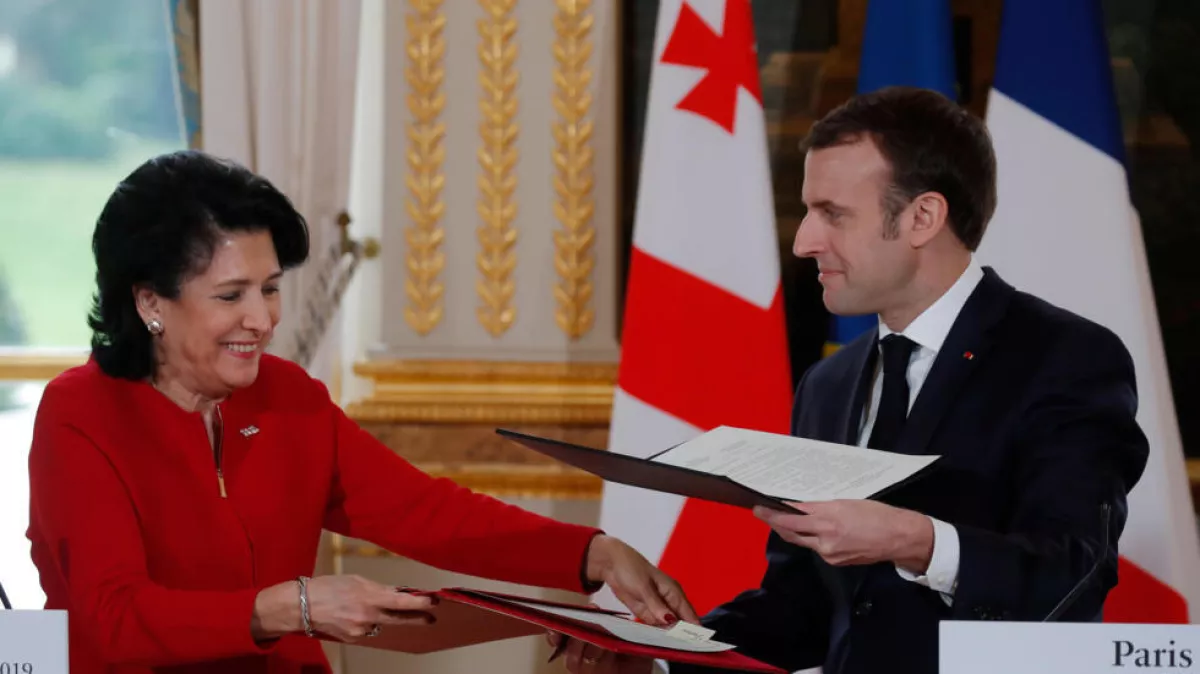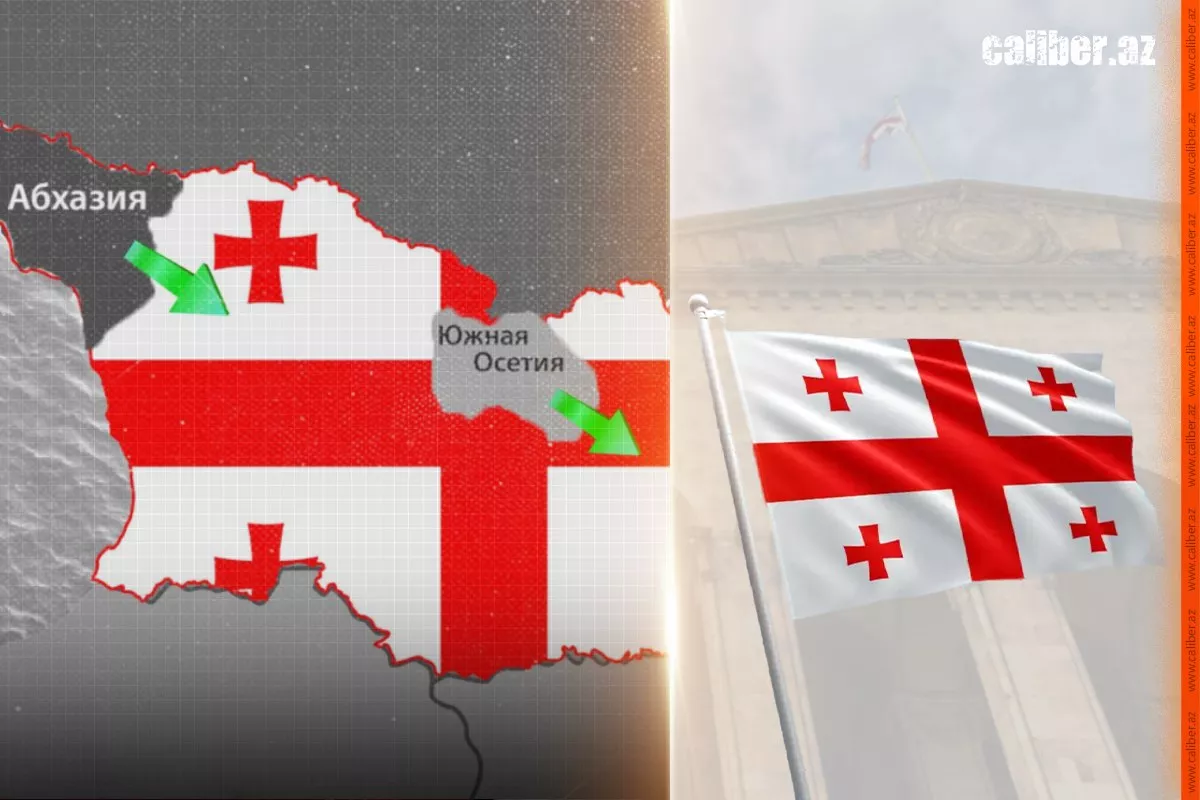"Armenian factor" in geopolitical situation around Georgia Tbilisi-Yerevan conundrum
The recent visit to Armenia by a Georgian government delegation headed by Prime Minister Irakli Kobakhidze can largely be considered a "routine" visit. This was especially true as it marked Kobakhidze's third official visit following the parliamentary elections, after trips to Azerbaijan and the UAE. During the visit, particular attention was paid to regional cooperation and transit transportation issues.
"The South Caucasus, including Armenia and Georgia, holds enormous potential. When discussing transit through the South Caucasus, we cannot ignore the role of Azerbaijan," stated Armenian Foreign Minister Ararat Mirzoyan. The fact that during the Georgian delegation's visit, the Armenian side positively mentioned Azerbaijan's role is itself a significant moment, especially against the backdrop of the growing realization in Armenia that the Zangezur Corridor is best opened "amicably."
However, as long as the Zangezur Corridor remains closed, cooperation between Georgia and Armenia is critically important for the latter, as Georgia serves as Armenia’s "gateway to the outside world." For Georgia, on the other hand, economic cooperation with Armenia is not considered "irreplaceable." Despite an overall growth in Georgia's foreign trade over the past year, trade between Tbilisi and Yerevan actually decreased, dropping from $1.123 billion in 2023 to $853.7 million in 2024. Exports from Georgia to Armenia fell from $787.2 million to $617.5 million, while imports from Armenia to Georgia dropped from $336.5 million to $236.2 million.
However, the role of the "Armenian factor" in the current geopolitical situation around Georgia should not be underestimated. At present, Armenian nationalists are divided over the future geopolitical strategy of the "Armenian project." Those in power in Yerevan today, along with Western diasporas, are clearly leaning towards the West, particularly the United States and the European Union. Russian Armenians, the remnants of the "Karabakh clan," and parts of the opposition within Armenia itself continue to bet on Russia. Yet, both groups are dissatisfied with the sovereign policies of Georgia's current leadership and are strongly opposed to the increasing geopolitical autonomy of Tbilisi.

Georgia's struggle for its sovereignty and resistance to the dictates of the United States and the European Union contrasts sharply with Yerevan's abrupt pivot towards "Eurointegration" and political alignment with the West. For the "pro-Western" Armenians, who have recently become "strategic partners" of the United States, an independent Georgia that rejects Western diktats is undesirable. Today's sovereign Georgia, which defends its national interests, effectively leaves Armenia "isolated" from the U.S. and the EU, especially from their favoured France. This stance prevents Armenia from establishing military logistics and undermines any plans for revanche with the help of the West.
At the onset of opposition protests in Georgia, Yerevan openly hoped for a "Maidan" victory, especially since the de facto leader of the opposition was the "former" French Foreign Ministry employee and Georgian citizen, Salome Zourabichvili. However, it has now become clear that the "Maidan" in Georgia failed, and the Paris-Tbilisi-Yerevan axis is not materializing. Nevertheless, in Yerevan, there remains hope that Georgia will eventually "yield" to the West in order to become a "bridge" to Armenia, which has swiftly pivoted from Russia to the West. This is diplomatically referred to as the "restoration of relations." In turn, the pro-Western Armenian lobby is prepared to exert efforts to turn Georgia into a puppet of Western geopolitical players, a goal that is being openly discussed.

"It is in Armenia's interest for the relationship between Georgia and the EU to be restored. Our diplomats and parliamentarians can play a role in this matter. It is important for Armenia not to be isolated in the region and to achieve significant results alongside Georgia. Equally important is ensuring that Georgia does not deviate from the Western path and makes at least minimal progress in this direction, even if it is not the same as it was three years ago, before the Russia-Ukraine conflict. Overall, Armenia and Georgia are more attractive to Western partners through joint programs. By initiating long-term programs, Tbilisi and Yerevan can have a clearer agenda and maintain sufficiently active relations," stated Armenian political analyst Johnny Melikyan in an interview with Armenpress.
Paradoxically, even pro-Russian Armenian nationalists essentially long for Georgia to return under the control of the West and its totalitarian dictates, as well as to confront Russia. The fact that this contradicts the interests of Russia—whose love and "gratitude" they so frequently profess—seems not to trouble the Russian Armenian lobby. The issue is that for these "pro-Russian" Armenian nationalists, the prospects of normalizing Georgian-Russian relations and the de-occupation of Abkhazia and the Tskhinvali region, with the return of refugees, become a "nightmare," as they would put an end to the "seaside Armenia" project in Abkhazia.
"Pro-Russian" Armenians simply dream of the confrontation between Russia and Georgia not only continuing but escalating, with the dividing lines between Tbilisi on one side and the still-separatist Sukhumi and Tskhinvali on the other remaining "eternal." Undoubtedly, political analysts and "experts" in Russia, serving the interests of the Armenian lobby, frequently claim that the enmity between the Abkhaz and Ossetians and Georgia is "forever," and that these peoples face "genocide" and other absurdities within Georgia.
On the other hand, in separatist Abkhazia, any Abkhaz who even hints at reconciliation with Georgians or attempts to establish contact with them is immediately branded a "traitor" and an "agent of Georgia and NATO." This policy clearly serves the interests of Armenian settlers, both current and potential, who are eyeing the fertile coastal land of Abkhazia, either maintaining the separatist status of the region or seeking its annexation by Russia.
To recap, Georgia's current territorial issues and its complex relations with Russia largely stem from the precedent set by the separatist project in Karabakh, which, through the efforts of the Armenian lobby, was extended to Georgia’s autonomous regions during the collapse of the Soviet Union. Armenian nationalists not only participated in the separatist war in Abkhazia in 1992-1993 (where the Bagramyan Battalion became notorious for its atrocities), but they also became the primary beneficiaries of this separatist project. Due to the expulsion of Georgians and the dwindling Abkhaz population, Armenians effectively became the largest ethnic group in Abkhazia, dominating the economy of the separatist region.

Abkhaz Armenians and their supporting Armenian lobby in Russia are today the main and uncompromising opponents of the normalization of Georgian-Russian relations, refusing even to entertain the idea of de-occupying this Georgian territory and allowing the return of Georgian refugees. They conduct their anti-Georgian policy under the hypocritical banners of supposedly "defending Russia's interests" against NATO and Türkiye. In this context, their enemies are not only Georgia but also the Abkhaz opposition, which is fighting against the appropriation of their native land by outsiders. Ahead of the so-called "presidential elections" scheduled for February 15, 2025, in separatist Abkhazia, these Abkhaz are being labelled as "agents of Türkiye."
A whole series of articles aimed at "exposing" the supposed "pro-Turkish conspiracy" of the opposition in Abkhazia and its "anti-Armenian activities" were published by the Armenian newspaper in Russia, Erkramas. On its front page, the paper prominently features not only the fascist war criminal Garegin Nzhdeh but also the former "state minister" of the separatists in "Artsakh," Ruben Vardanyan. Erkramas writes, "Ankara seeks to weaken the position of the Armenian community in Abkhazia, which has historically developed pro-Russian and anti-Turkish sentiments. The Armenian community plays a significant role in the political and economic life of Abkhazia, and its weakening could become an additional resource for strengthening Türkiye's position." The publication directly accuses one of the Abkhaz opposition members of, "during his frequent visits to Türkiye, as insiders report, conducting political consultations with representatives of Georgia." In other words, these Armenian "friends" are effectively forbidding the Abkhaz from even contacting representatives of Georgia.
It is evident that, as part of the normalization of relations between Russia and Georgia, steps must be taken to restore Georgia's territorial integrity and to foster reconciliation between Georgians and Abkhaz. The mandate of trust that the Georgian population has placed in the Georgian Dream party is largely based on such hopes. However, Armenian nationalists, who aspire to position themselves as the "outpost of Russia in the Caucasus," are doing everything to prevent this from happening, unwilling to abandon the "Armenization" of Abkhazia. Although they fully understand that delaying the normalization of relations between Russia and Georgia will automatically increase the likelihood of Georgia falling back under Western control, with the potential opening of a disastrous "second front" for Russia.
Vladimir Tskhvediani, Georgia, for Caliber.Az








